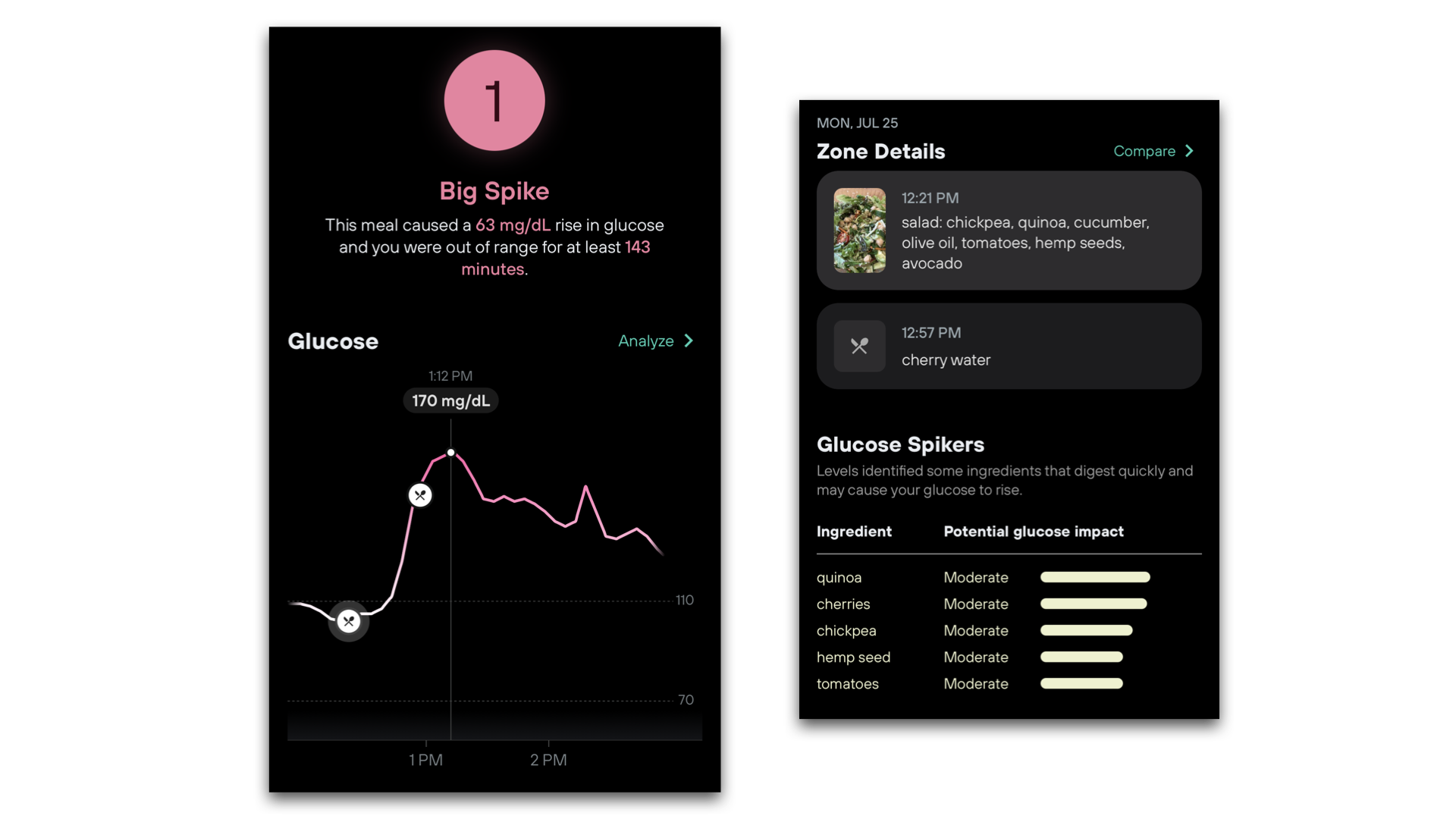Original link: https://weichen.blog/letters/59/
Hello friend!
This is the 59th issue of “Life Adventures”, sharing seven small things with you each week to design a healthier, richer, wiser and more interesting life together.
An energy roller coaster
Recently I finally got a Continuous Glucose Monitor (CGM) to monitor my blood sugar levels continuously.
I discovered early on that my energy levels plummeted after a meal, especially in the afternoon, but never knew why. Josh Clemente has this problem too. He once bought a blood glucose meter himself and pricked his finger several times a day to measure his blood sugar levels. Later, he used the continuous blood glucose monitor after getting a prescription from a doctor friend. He was surprised by the results: ” It told me that I was at a pre-diabetic level. ” Technology helps people understand data.
I was also amazed on the first day of use. The Levels app shows how your blood sugar changes two hours after eating, and gives it a scale from one to ten, with lower scores being worse. I had a plate of salad and a few cherries thinking it couldn’t be healthier, but only got one point.

According to the standard, blood sugar over 140 mg/dl after eating is considered pre-diabetic, and my blood sugar suddenly soared to 170 mg/dg. While it wasn’t a medical diagnosis, it made me realize that my metabolism was indeed not as healthy as I felt it to be.
Studies have shown that only 12% of Americans have a healthy metabolism. According to Dr. Peter Attia , even in non-diabetic patients, excessive blood sugar fluctuations and high blood sugar spikes are associated with many diseases, increasing the risk of cardiovascular disease, Alzheimer’s disease, frailty and cancer. Poor metabolic health can also affect brain function, energy, memory, skin health, and more.
Metabolic capacity, like physical fitness, can be improved through exercise. I’m still learning and collecting data, and if you’re interested in this topic, I’ll write about some life changes that would help.
Two dogs and us
Recently, I was helping a friend watch the dog. It is a golden retriever, very docile and cute.
The only problem is that it always picks up branches to eat, or bites the rope when it is about to get home. I didn’t know what to do with it at first, I was very angry and exhausted after fighting it.
Then I found myself ridiculous. It does so by nature, not on purpose. It’s not surprising that puppies do this, since even humans are easily dominated by emotions.
When someone is carried away by emotions and does something wrong, it is often not “intentional” to get angry, or to “intentionally” do hurtful things. To put it simply, it’s like the knee-jerk reflex, losing control of the self.
Humans are animals too. The difference is that dogs need people to tame, and humans can tame themselves.
Three tame yourself
Learning self-control is a process of taming yourself. However, the word “control” is not appropriate, because like training animals, there is no coercion.
I used to make a list of “what to do when I’m bored” in order not to waste my time. For example, you can do ten minutes of exercise, read a few pages of a book, and summarize what you have learned. But the list never came in handy.
It was only later that I discovered that when I was bored, I didn’t even remember that list. The root of the problem is not that I don’t know what I can do, but the state of mind that I don’t do those things. If there were, I would do it and not get bored.
Recently discovered that the best way to do this is to sit and meditate. After the mind is calm, the motivation to do things naturally arises.
I can’t force my mind to calm down, all I can do is create a condition that allows my mind to calm down.
Related: “Setting the Stage” is mentioned in Issue 33 . (But now I find the word very obscure, from my crude translation of “set the stage”…)
Four Unlimited List vs. Limited Life
Another change I’ve tried recently is to use a calendar for planning, marking what time to do what instead of a to-do list.
Nir Eyal, author of “Indistractable” (the Taiwanese translation is called “Concentration Agreement”), talked about the problem of to-do lists in a podcast :
1. When you wake up in the morning and look at your list, would you choose something more important and more difficult to do, or something simple? It’s easy for us to choose simple if we don’t have more important things planned through our schedule. It feels good to quickly cross things out, but maybe things don’t have much value on their own.
2. The to-do list has no length limit, you can keep adding tasks to it, creating the illusion that we can always finish it. The advantage of using a schedule is to force yourself to face the limitations of time.
3. Day after day, year after year, your list never ends. This can make you feel like an underachiever, and you get used to it and it becomes a negative feedback.
“The criterion for judging success is not whether we have ticked off all the tasks. The only criterion for judgment should be whether we follow the plan and devote ourselves to the things to be accomplished.”
My own experience is that there is a great sense of hindrance to using a calendar. It used to be just a matter of adding an item to the list, now I have to decide when I do it and how long it takes to do it. If not, I’ll have to add it to the next day’s schedule. But the difficulty is real because reality is cruel and our time is limited.
Recommended: A time management guide that faces reality
Journey of Five Meanings
In 2001, four college graduates embarked on a road trip around the United States. They want to know how their life should be lived in the most meaningful way. They interviewed people from all walks of life to find out how they all found their passions. They turned the interview records into a documentary, and eventually established a non-profit organization called Roadtrip Nation. You can see the documentaries they have produced over the past two decades on the website . The site also offers a tool that matches your interests with people in related occupations.

(Source: Roadtrip Nation)
I like them because they provide a ton of real-world examples, each with a different career trajectory. I found that most of those who love their profession have rich life experiences, have made many attempts and changes, and are constantly striving for a better life.
(I say this because I signed up for a road trip next year to see if I can be selected ?)
Six How to View Suggestions
In the previous issues, we talked about decision-making, and Buer shared with me several principles listed in Zhang Xiaoyu’s top Weibo, which I think sums it up very well:
“1. The first priority in decision-making is to create enough good choices for yourself. Most decision-making failures come from repeatedly entangled in several choices that are not good enough;
2. For small daily decisions, the speed of decision-making is greater than the quality of decision-making, so don’t delay; for major and difficult-to-reverse big decisions, you must collect enough information to ensure that you get it right;
3. Do not make judgments and decisions lightly before reaching the threshold of the amount of information collected. Say “I don’t know” to yourself and others;
4. Not every problem in life needs to be solved, coexisting with problems is the norm in life. focus on important things;
5. Do not equate decision outcome with decision quality. Learn to build your own decision-making system. “
Remind yourself, however, that other people’s principles only work if they are linked to your own experience.
“Nivi: I think the most dangerous thing about following advice is that the person who gave it won’t be around to tell you when it no longer applies.
Naval : I see advice a little differently than most people. I treat the advice as anecdotes and adages that I can recall when I have my own direct experience: ‘Ah, that’s what that guy said. 』
If you’re inexperienced, other people’s suggestions read as just quotes. They are cool and inspiring for a moment. Maybe you can use it to make a nice poster. But you quickly forget how you did it or how you did it.
Those suggestions succinctly help you recall your accumulated knowledge. “
Seven Sufferings and Empty
There is a famous saying: “Pain is inevitable, but suffering is willing.” (“Pain is inevitable. Suffering is optional.”)
From a mindfulness perspective, the phrase can be understood like this: “If you’re suffering, you’re lost in thought.”
Well, I hope to inspire you!
If you like this issue, please help to share it with your friends, this is a great encouragement to me.
See you next week,
Wei Chen
This article is reprinted from: https://weichen.blog/letters/59/
This site is for inclusion only, and the copyright belongs to the original author.